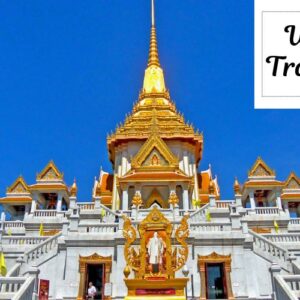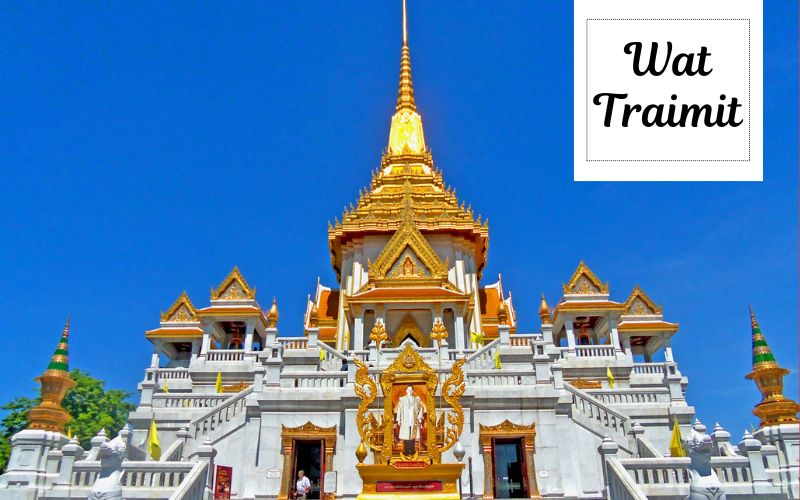
Ranked among the TOP 10 most beautiful temples in Thailand, Wat Traimit – Temple of Golden Buddha is a destination that you cannot ignore. This temple not only possesses unique architecture but is also associated with exciting historical stories and pure golf Buddha statues. This is enough to transform this spiritual place into one of the most popular tourist attractions in Bangkok. So, what historical stories are, and how to have a perfect visit to this beautiful temple? Let’s find out in this article!
About Wat Traimit
- Address: No.661 Tri Mit Rd, Talat Noi, Samphanthawong, Bangkok, Thailand.
- Opening Hours: Wat Traimit: 9 am to 5 pm (daily). Temple Museum: 8 am to 5 pm (except Monday)
- Entrance Fee: 60 – 100 Baht (~$1.7 -2.84)/ person to enter the museum. 40 Baht (~$1.14)/ person to see the Buddha statue
Wat Traimit or Golden Buddha Temples is one of the most famous temples in Bangkok. The temple is located in the center of Chinatown, attracting both locals and international tourists. The name Golden Buddha Temple comes from the fact that it is a place where treasures of pure golf Buddha statues are preserved. The statue is directly located in the main hall, and visitors can enjoy it nearby.
History and Origin of Wat Traimit
The Golden Buddha Temple was built between the 13th and 15th centuries, during the Sukhothai period. This was also the period when Thai Buddhism flourished. When the Burmese army entered the capital, the famous golden Buddha was covered with a layer of plaster to prevent its destruction. Due to the requirement of absolute secrecy, those who carried out this work were killed after completion.
Before reaching the current Wat Traimit, the precious statue was moved several times from one place to another. In 1995, while being transported to a temple in Bangkok, the statue slipped from a crane and fell into a mud pit. The statue remained there for a long time, as no one proceeded to recover it.
After that, there was a monk who was told in a dream by the Buddha, so he went to pick up and pull the state. Through the crack in the statue, the monk saw a flash of golden light, indicating that the golden Buddha had been reborn. The mud also caused the plaster covering the exterior to peel off, from which people could clearly see the preciousness of the statue.
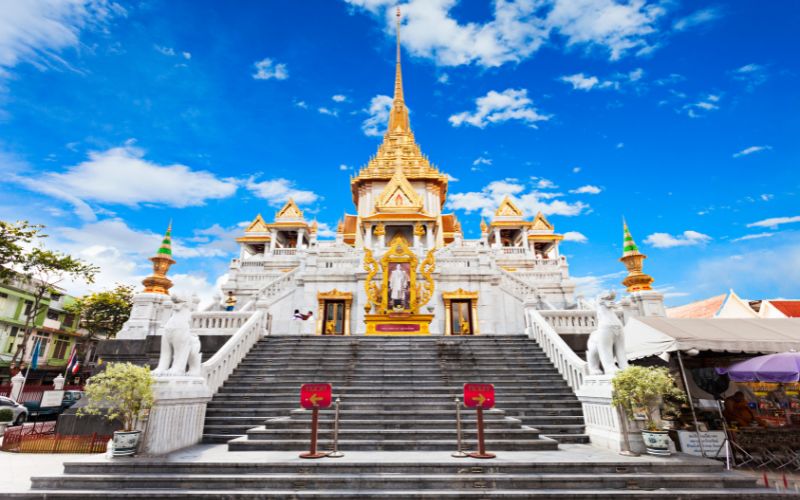
Overview of Wat Traimit
How to get to Wat Traimit?
Wat Traimit is located in the heart of Chinatown, so if you are visiting this area, just go to the welcome gate at the beginning of the street to reach the temple. If you are staying at Khaosan Road, go to Phra Arthit River Pier 13, take a boat, and return to Marine Dept Pier 4 or Rajawongse River Pier 5. Pier 4 is about 800m from this temple while Pier 5 is a bit further. If you want to go to Wat Traimit by bus, you can walk from Khaosan to the main road, find the bus stop, and take bus number 159.
For other places in Bangkok, follow the route by the following means:
Public Bus
Public bus is the most suitable way to get to Chinatown and the Golden Buddha Temple. You can select multiple routes, including 1, 4, 25, 73, 85, 159, 507, 508 and 529. Among them, bus No.159 runs along Khaosan Road, Grand Palace, Chinatown, Phraya Thai, and Chatuchak Weekend Market.
Tourists heading to the Pratunan region can choose route 73, the car goes along Pratunam, Central World, Siam, MBK, and then to Hua Lamphong Station. Until this station, you only need to walk another 300 meters to reach the Golden Buddha Temple. In short, tourists can search for the route of each bus line by themselves, and choose the route closest to their destination.
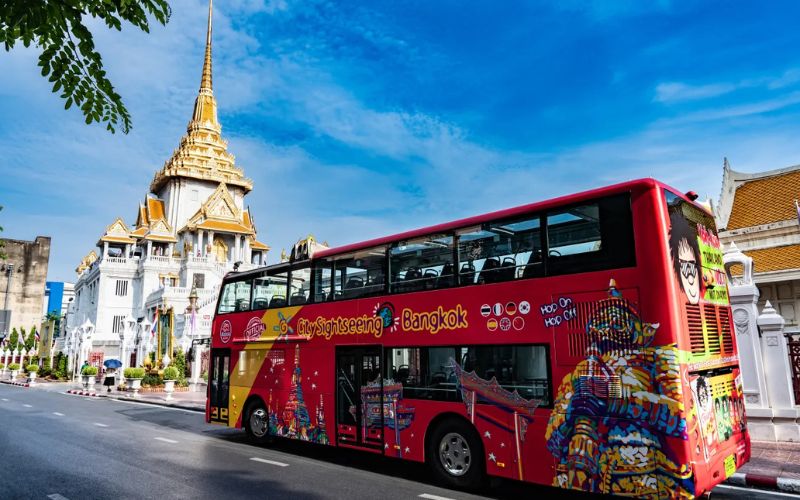
Bus in Bangkok
BTS or MRT Subway
To get to the Golden Buddha Temple, you can go to Hua Lamphong MRT Station. This station is located only about 300 meters from the temple. For convenience, you should combine both BTS and MRT. If you are at Asoke, Sukhumvit Road, take the subway at Sukhumvit MRT station and go straight to Hua Lamphong MRT. Pratunam guests can use the Phaya Airport Tram to Makkasan. Then, change to the subway, and go from Phetchaburi Station to Hua Lamphong MRT.
In addition, from Pratunam, you can also transfer from Phaya Thai BTS to Sala Daeng BTS and have to change trains at Siam BTS. From Sala Daeng BTS, you just need to walk about 200 meters to Silom MRT Station and then go to Hua Lamphong MRT.
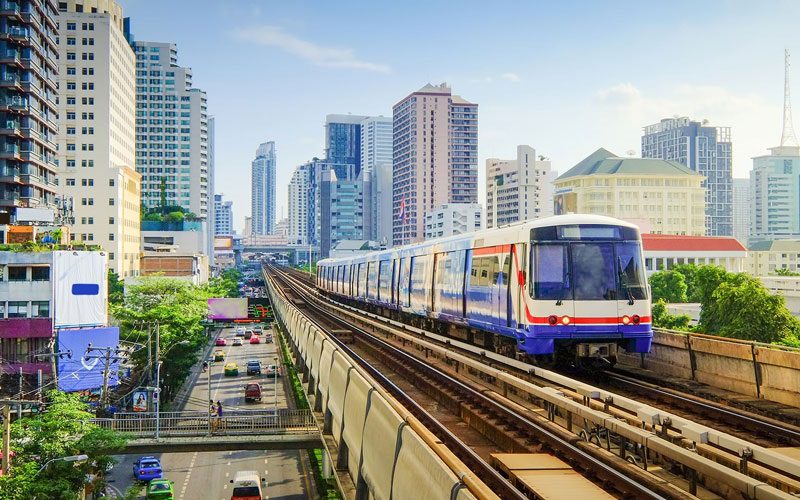
BTS Skytrain
>>> If you prefer private car for flexible transfer, please reach out our Thailand car rental for more information.
Taxi or tuk tuk
Taxis and tuk-tuk are suitable means of transportation for large groups of tourists. With these 2 vehicles, you will not need to inquire about the route, just get in the car and ask the driver to go directly to the Golden Buddha Temple.
However, the cost will be a bit higher than other means of transportation, usually around 100 Baht (~$2.84). If you go by tuk-tuk, consider paying the fare first.
If you need private space, IDC Travel offers you the service of private car rental with drivers throughout the country at an advantageous price (starting from $45).
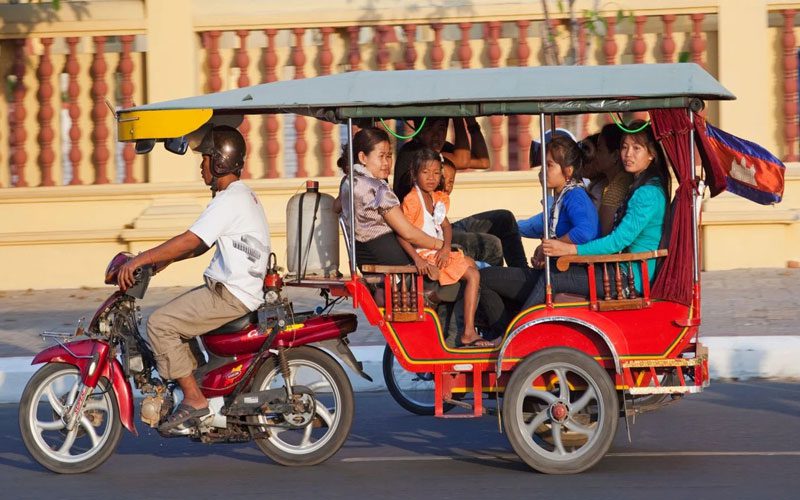
Tuk tuk
Things to do in Wat Traimit
Marvel at the Golden Buddha Statue
The main attraction of Wat Traimit is the Golden Buddha, which is truly a sight to behold. Towing nearly five meters high and weighing over 5.5 tons, this is the largest solid gold statue in the world. Beyond its impressive size and beauty, the statue has a fascinating history. It was covered in plaster to hide its true nature and protect it from invaders centuries ago. When the plaster cracked accidentally by a monk in the 1950s, the gold beneath was revealed!
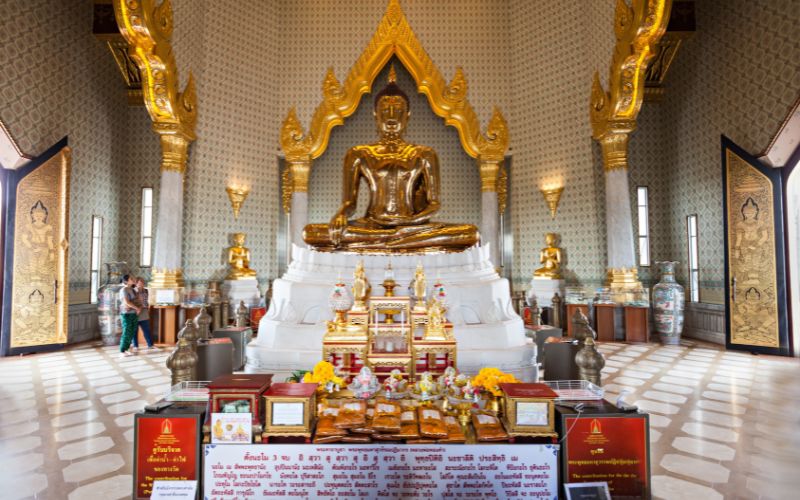
Golden Buddha Statue
Explore the Wat Traimit Museum
Just steps away from the Golden Buddha, the Wat Traimit Museum shares the intriguing story behind the statue and offers an in-depth insight into Bangkok’s Chinese community. The exhibits are engaging and interactive, bringing history to life and providing a richer cultural perspective on the area.
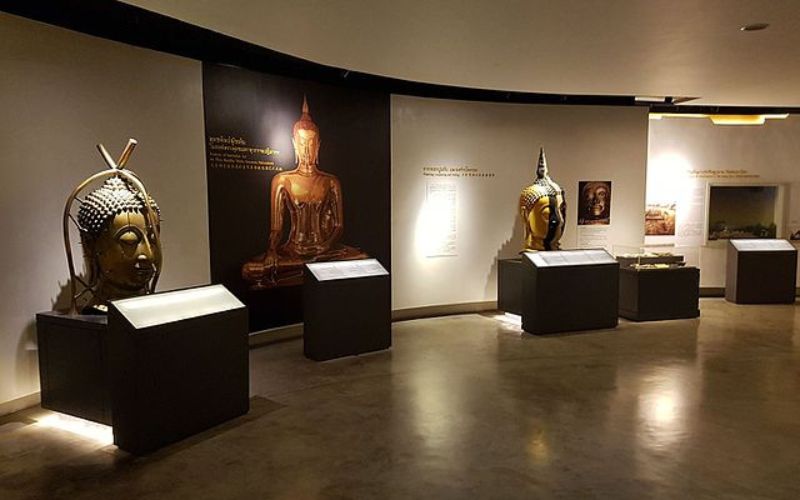
Golden Buddha on the third floor
Capture Stunning Photos of the Temple Grounds
Want to take some photos to capture all the moments during your visit? The intricate architecture, golden accents, and beautiful carvings make Wat Traimit a photographer’s paradise. Whether you’re capturing the exterior with its bright gold details or the serene inner sanctum, there’s no lack of breathtaking spots to remember your visit. Photography is allowed throughout the temple grounds, just remember to be respectful and avoid using flash inside the buildings.
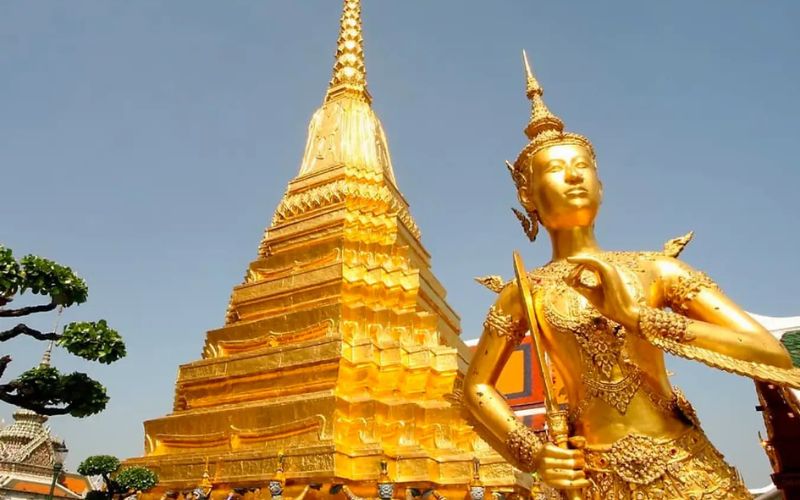
Unique spot in Wat Traimit for taking photo
Participate in Prayer Rituals
Visiting Wat Traimit means participating in an active place of worship. Visitors are welcome to join in or simply observe the prayer rituals. Participating respectfully in these practices offers a meaningful glimpse into Thai Buddhism and adds a spiritual dimension to your visit.
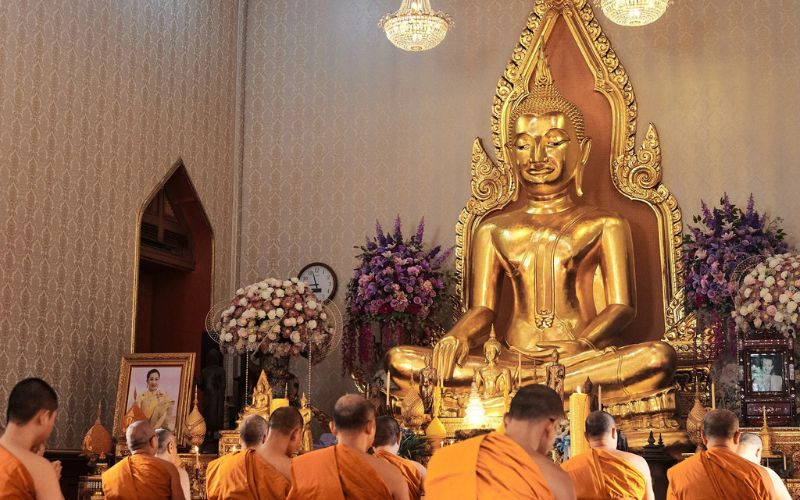
Prayer Rituals at Wat Traimit
Visit the Chinatown Heritage Center
The Chinatown Heritage Center is a hidden gem in the Wat Traimit temple complex. Situated on the ground floor of the temple complex, it offers an immersive journey into the lives of the Chinese immigrants who settled in Bangkok generations ago. Visitors can admire a lot of unique exhibits with cultural artifacts, especially audio-visual presentations. All of this adds a deeper layer to your visit, stimulating your understanding of Bangkok’s diverse cultural tapestry.
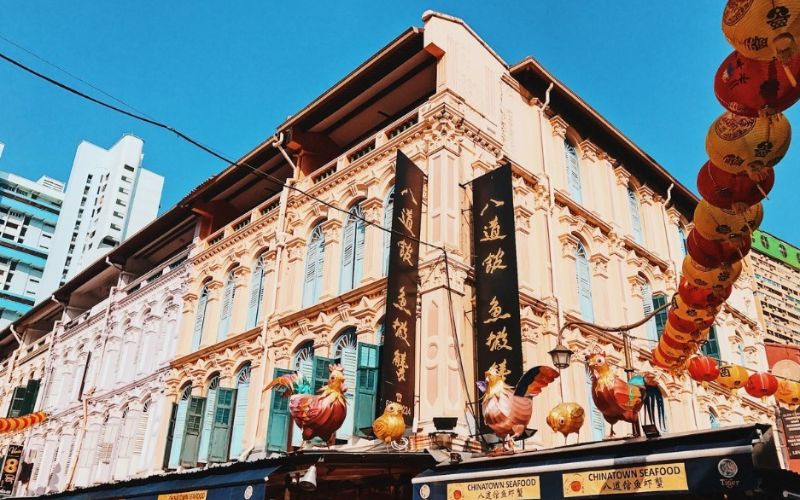
Chinatown Heritage Center
Nearby Attractions and Food Options
Chinatown
Since the temple is located near Chinatown, you can stroll through this busy neighborhood. Bangkok’s Chinatown is a vibrant and colorful neighborhood with lively street markets, gold shops, Chinese restaurants, temples, second-hand shops, Chinese posters, and a maze of small streets. Fortunately, the community has retained its cultural characteristics but avoided commercial reconstruction.
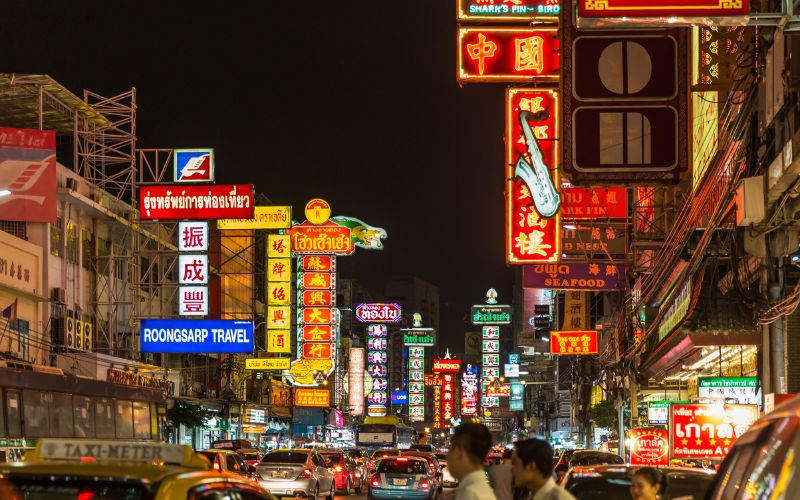
Chinatown
China Gate
The entrance to Chinatown is the China Gate located in the middle of the five-way intersection known as the Odeon Circle. Around the gate are two white jade statues of lions and rabbits. Locals believe that you will be lucky and rich if you put your wallet in the lion’s mouth. The rabbit is a gift from China to celebrate the 2011 Year of Rabbit.
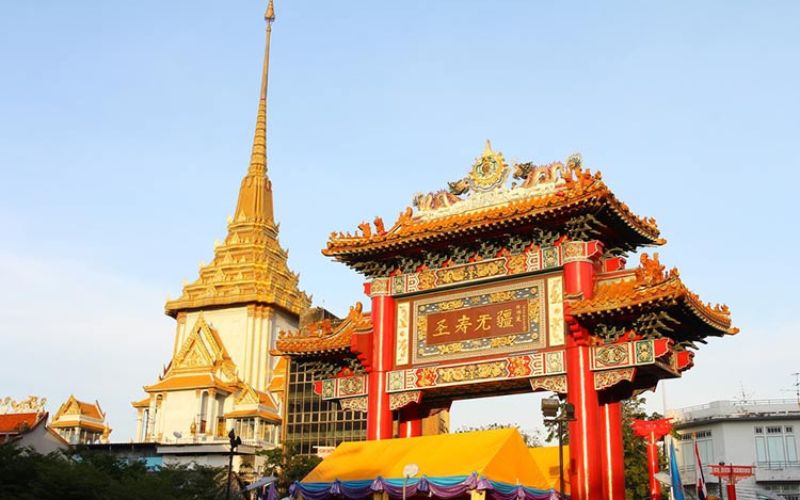
China Gate in Bangkok
Wat Mangkon Kamalawat
Wat Mangkon Kamalawat is the most important Chinese Temple in Bangkok with Buddhist, Taoist, and Confucian shrines. The temple is usually quite crowded, but all are local Thais of Chinese descent, not tourists. They come to make merit, pray for health, and wealth, and burn paper to worship their ancestors amidst the smell of incense and smoke. The temple is also the main center of Lunar New Year celebrations and the annual Chinese Vegetarian Festival.
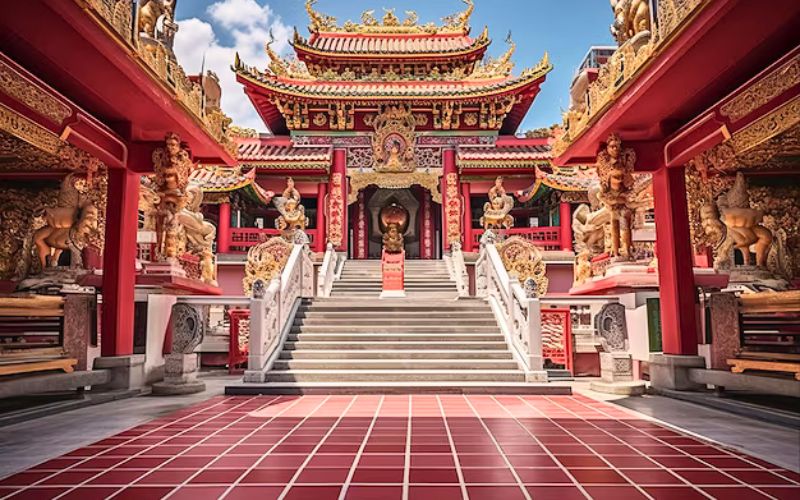
The magnificent Wat Mangkon Kamalawat
Sampeng Lane Market
The central road of Yaowarat is filled with commercial activities, with the company mainly importing traditional medicines, golf, jade, ceramics, and foods from China. Soi Yaowaphanit is a shoe wholesale center in Bangkok, with over 70 shoe stores in the surrounding area. The main shopping section of Chinatown is Sampeng Lane, also known as Soi Wanit 1, a narrow alley running parallel to Yaowarat to Phahurat. It is a crowded market with small wholesale shops and a plaza selling cheap daily necessities and accessories mainly imported from China.
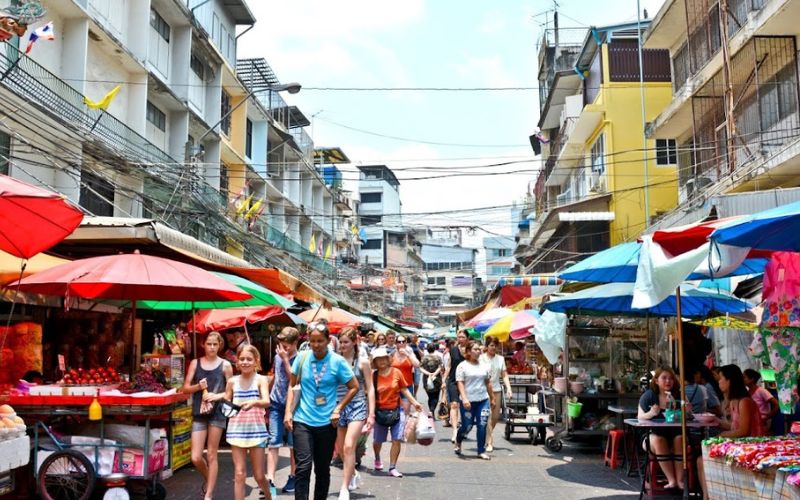
The commercial Sampeng Lane Market
Visitors to the Golden Buddha Traimit often say that while it is not one of the best temples in Bangkok, it is worth a visit. The Buddha Statue is breathtaking and the temple grounds are also beautiful and worth a visit. Starting from the temple, you can also quickly walk into Chinatown, where Thai tourists can take a full-day walk.
If you plan to visit Thailand, including Wat Traimit, please contact us for more details. Our experts are always willing to help you!

